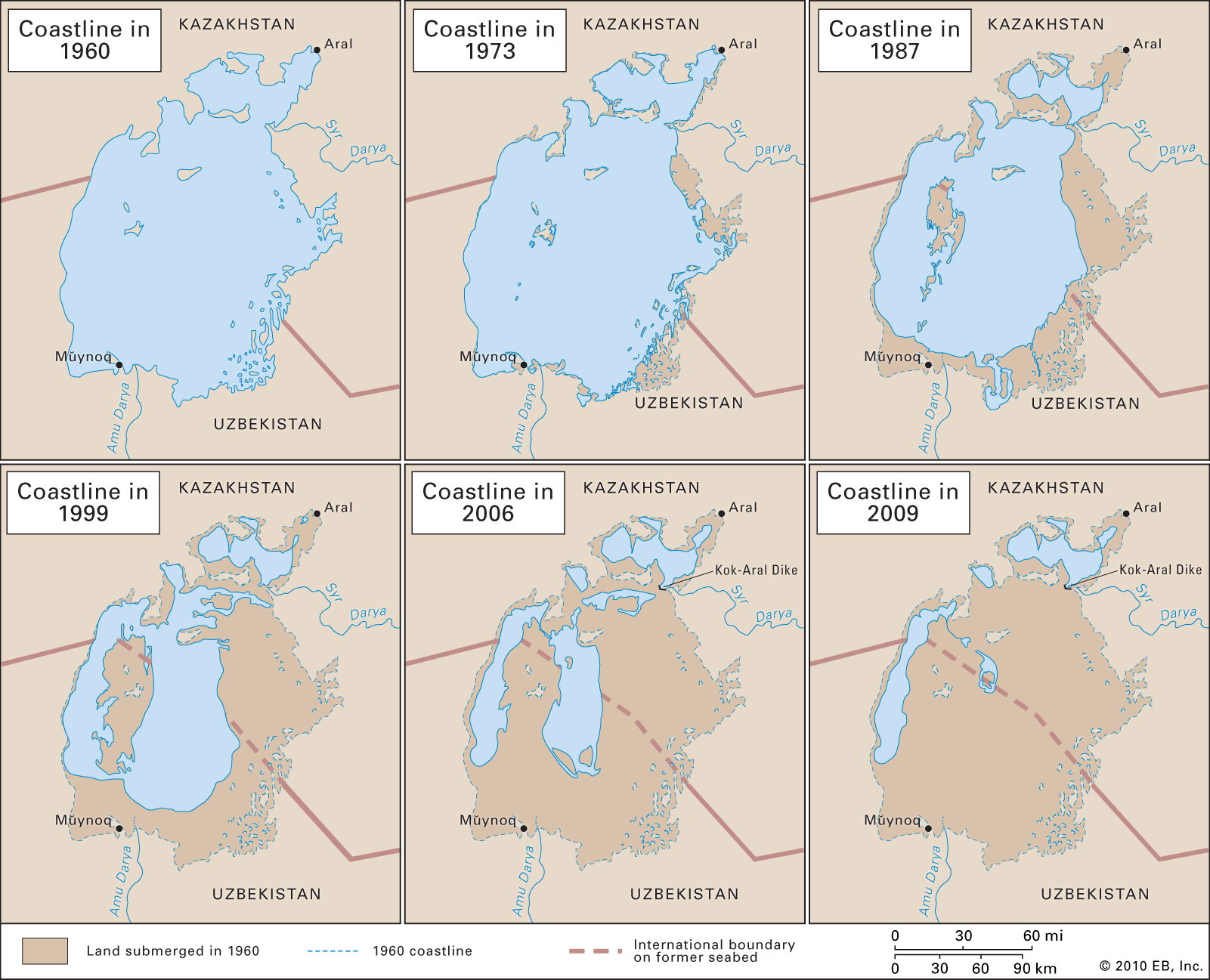October 16, 2018
Clothing is pollution!
That's the latest dotty shriek from the Greenies below. But what really is a source of severe pollution, the manufacture of solar panels, passes without a murmur from them.
And their picking out the shrinkage of the Aral sea (not to be confused with the sea of Azov, the world's shallowest sea) is particularly dotty. Rivers flowing into the landlocked Aral sea were diverted in Soviet times. It had nothing to do with anything recent or modern. The Aral sea does still exist. The Russians have dammed off the bottom two thirds so that what is left of the inflow remains in the Northern third

The idea that the bright young things of Britain will refrain from buying clothes is a laugh.
And all modern industrial activities generate pollution of one sort or another so it makes no sense to pick on just one. Why not pick on woodfires instead? Because it is "natural", Greenies favour wood fires for domestic heating. But such fires are now so widely used that air pollution in London is now nearly as bad as it was in the bad old days. That would seem a clear type of harm rather than the highly inferential harm caused by dressing fashionably
And what about synthetics? Should we use only synthetic fibres instead of cotton? You can be sure that Greenies would have a kneejerk opposition to that. Lets all go naked! You could do that where I live but it might get a bit chilly in a British winter
Today, the scrubland that was once the Aral Sea in Central Asia is dotted with camels searching out sparse tufts of grass against a flat, sandy horizon. Only the bizarre sight of boats marooned hundreds of miles inland gives any clue to the area's history. In just four decades, what was once one of the largest inland bodies of water on the globe has shrunk by more than two thirds – an area the size of Ireland – leaving behind a poisonous dustbowl.
And the reason? Our insatiable appetite for cheap jeans – and the rapacious cotton farming that feeds it at almost any cost.
Tomorrow, in a devastating assault on an industry that dictates so much of our high street economy, investigative journalist Stacey Dooley will brand fashion one of the biggest environmental disasters to hit the planet.
With Britons buying twice as many clothes as a decade ago – last year we spent £50 billion – there is mounting concern about cheap, disposable fashion sometimes branded 'look and chuck'. Stacey's BBC documentary Fashion's Dirty Secrets will throw this into sharp relief. It reveals that, around the globe, millions of gallons of clean water have either been diverted to growing cotton, or have been hopelessly polluted by the toxic chemicals used for dyes and manufacture. The facts are stark: to grow enough cotton to make a single pair of jeans can take 3,400 gallons or 15,500 litres of water.
But that is only part of the issue – because the fashion industry's pollution problem is also out of control. Factories connected to high street brands have been dumping chemicals from clothes production into Indonesia's Citarum River, says Dooley, threatening the lives of millions.
Serious problems are already evident in the UK, too. The trend for cheap, disposable fashion means more than 300,000 tons of clothing are dumped in landfill in Britain alone each year, which last year worked out at 235 million items.
Meanwhile, microfibres from fleeces and sportswear are now a significant cause of plastic pollution in our rivers and oceans: 700,000 fibres are released in a single domestic wash.
Stacey, who is currently appearing on Strictly Come Dancing, says on the documentary: 'It's impossible to go down any high street without being bombarded by images luring us into buying cheap clothing. But the few pounds we spend on an item of clothing isn't the true cost.
'It's costing people their livelihoods. It's costing millions of people their health. In fact, it's costing us the earth. It's a situation that needs addressing and fast. There has to be a real sense of urgency now because to be totally honest with you we are running out of time.'
In fact, there is growing momentum on the issue, with many officials now recognising the need for urgent action. Last week, for example, Parliament's Environmental Audit Committee wrote to Britain's ten biggest clothing retailers asking them to reveal their environmental footprint.
They quoted evidence that British shoppers buy far more new clothes than any other European nation. The firms involved, all high street favourites and supermarkets, include Marks & Spencer, Primark, Next, Arcadia, Asda, T K Maxx, Tesco, J D Sports, Debenhams and Sports Direct International. Most churn out hundreds of new fashion lines a year, constantly updating their stock and fuelling trends.
MARY Creagh, chair of the Committee, said: 'Instagram is fuelling this as people are adopting a 'look and chuck' mentality – we've got a lot more fast fashion.
'If you look at Italy's fashion market, there's much more focus on high-end clothing and people tend to save up and buy just one or two garments, like Max Mara coats, which are timeless.
A spokesman for the Department for the Environment, Food and Rural Affairs said: 'We are interested in any ideas to reduce the impact of waste on our oceans and wider environment. We have already cut waste from plastic bags and microbeads and we are also taking action on plastic bottles, straws, stirrers and cotton buds.
'We are funding research into new ways to deal with micro-plastics but there is more to do.'
DETAILS OF REGULARLY UPDATED BLOGS BY JOHN RAY:
"Tongue Tied"
"Dissecting Leftism"
"Australian Politics"
"Education Watch International"
"Political Correctness Watch"
"Greenie Watch"
"Western Heart" (A summary blog)